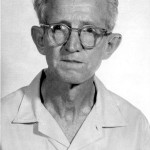When most people think of Panama City, Florida, they think of the pearly white beaches, the great eateries, and the upside-down house. There is, however, a less known secret about criminal defense, hidden within law books nationwide, and honestly, I wouldn’t have thought to look there at all.
More than 50 years ago, in 1961, a man was reported breaking and entering into the Bay Harbor Pool Room in Panama City, smashing a record player and cigarette machine, and stealing money from a cash register. Eventually, the suspect, identified as Clarence Earl Gideon, was arrested, prosecuted, and served his sentence. Case closed, right? Wrong.
Just like many other defendants, Gideon is brought into custody, but unlike many other defendants, he can’t find the money to get an attorney. He asks the judge assigned to his case for legal counsel (a criminal defense lawyer to defend him) due to his inability to afford a lawyer. The court responded by denying his request since Florida law did not require the court to assign him an attorney in cases where the defendant had only been charged with a non-capital felony offense. When his case was finished, Gideon was sentenced to prison.
While serving his sentenced time, Gideon began to think a lot about his rights, feeling that he was unfairly put in jail, that his rights were violated. He began to read up on the Constitution and higher courts, because I’m sure they have a lot of law books in jail. He decides that he has been treated unfairly, so he writes a paper while in jail requesting that his case be retried in a higher court because he wasn’t given some basic constitutional rights, such as in the fourteenth amendment, where it states, “…No state shall make or enforce any law which shall abridge the privileges or immunization of citizens of the United States…” and in the fifth amendment, where it says, “…Nor shall any person be compelled in any criminal case to be a witness against himself,” or in the sixth amendment, where it says, “If the defendant cannot afford an attorney, the trial judge must appoint one on his behalf.”
With 3 constitutional amendments on his side, he sent his case to higher courts until he reached the Supreme Court. Eventually, his case reached the Supreme Court, and was argued for by Hugo Black. Black said, “…Reflection and reason require us to recognise that in our system of justice, any person brought into court who is too poor to afford an attorney cannot be insured a fair trial unless counsel is provided to him.” He also wrote that the “noble ideal” of “fair trials in which every defendant stands equal before the law . . . cannot be realized if the poor man charged with crime has to face his accusers without a lawyer to assist him.”
As a result of this decision, the Supreme Court retried the case on August 5th, 1963. This time Gideon was assigned a Panama City attorney, Mr. W. Fred Turner. Gideon was found not guilty, and as a result, two-thousand felons not previously provided with a lawyer were released. But it’s not over yet!
When the Supreme Court ruled in favor of Gideon, it overturned a 1942 ruling made by the Supreme Court, the trial of Betts v. Brady. This case said that indigent, or poor, defendants would not be provided a lawyer if they could not afford one, but did not overrule the Powell v. Alabama case of 1932. This case said that capitol offenders were to be provided with a lawyer. Basically, Gideon v. Wainwright said that everyone, not just capitol offenders, were allowed the right to a lawyer (public defender).
As a result of the trial, Anthony Lewis wrote a book called ‘Gideon’s Trumpet’ in 1965, which won an Edgar Award for best factual crime book later that same year. Hallmark picked up on the wave of Gideon media, and made a TV movie based on the book, based on the case (also called ‘Gideon’s Trumpet’), in 1980.
Also, if you went to law school or watch a lot of cop shows, you know what the right to remain silent is. That is one of the five clauses listed in the Miranda Warning, along with a clause that says that anything you say or do can be used against you in court.
The five rights listed in the Miranda Warning, called the Miranda Rights, are as follows:
1. All criminal suspects have the right to remain silent.
2. Anything they say or do may be used against them in court.
3. You have the right to consult a criminal defense attorney before speaking to the police and to have an attorney present during questioning now or later.
4. If you cannot afford a criminal defense attorney and you wish to have one, an attorney (a public defender) will be appointed for you before any questioning begins.
5. If you decide to answer any questions now, without a criminal defense attorney present, you have the right to stop answering at any time until you consult with an attorney.
The Miranda Warning and Rights were put in place because of the 1964 Miranda v. Arizona case, but did you know that case was an extension of this case? It had pretty much the same premise: Ernesto Miranda was taken into custody, but, for whatever reason, didn’t know he had the right to remain silent. He signed off on papers saying that what he was going to say was voluntary, but all he knew was that you had to sign those papers (you don’t). Later, his lawyer found out about this, and appealed to higher courts until he got to the U.S. Supreme Court. The Supreme Court ruled in favor of Miranda, but told him that his case was to be revised and remanded, meaning that the Supreme Court ruled in favor of Miranda, but he had to retry his case in the county court. (He lost).
So, I hope you understand how this one man, Clarence Earl Gideon, influenced so very many lives, and how he was responsible for a book, a movie, two landmark Supreme Court cases, the overruling of Betts v. Brady, the release of over two-thousand Florida felons treated unconstitutionally, for every United States Citizen charged with a crime to be represented by an attorney, but best of all, an incredible piece of local Panama City history known all around the country.













